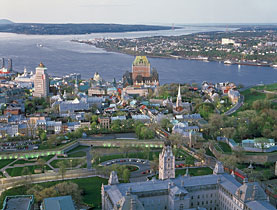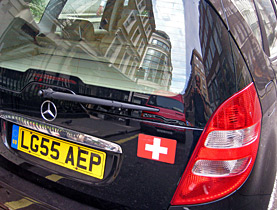Quebec marks 400th anniversary

The city of Quebec, the cradle of French-speaking civilisation in North America, celebrated its 400th anniversary on Thursday.
swissinfo talked to Canada’s ambassador to Switzerland, Robert Collette, about the important role the city has played, not just for the Canadians, but also for other nationalities such as the Swiss.
Celebrations of the anniversary will continue for the next ten months, with 130 cultural, sporting, economic and political events during that time. Around 5.5 million tourists are expected to visit.
swissinfo: What is the significance of this anniversary?
Robert Collette: Quebec’s foundation coincides with the foundation of modern Canada. It is the starting point of a new country, a rather remarkable country that is now a global player and was built by immigrants from all over the world. Many of those immigrants were Swiss, who began moving to Canada after 1604 to become farmers or soldiers.
At the time, there were whole regions of Quebec populated by people from Fribourg for example. Some Swiss left, but others stayed along with the French and the British.
There were other periods of large-scale immigration. In the 1960s and 1970s, around 35,000 Swiss farmers moved to Canada and helped develop its economy. There must be around 200,000 to 300,000 Canadians of Swiss origin. Switzerland is the fifth biggest foreign investor in Canada, ahead of Germany and Japan.
swissinfo: What exactly is being celebrated?
R.C.: We are celebrating the arrival of [French explorer] Samuel Champlain and the foundation of the city of Quebec in 1608. Champlain wanted to explore America, establish a presence and found a new country. When he set sail, he wasn’t perhaps thinking in those terms, but when he reached the site on the St Lawrence River occupied by Quebec today, he decided to found a town. That led to the creation of a country.
Champlain was France’s governor of Canada for 29 years. He had a huge impact on the evolution of Canada – or New France, as it was then called. Champlain was a remarkable person, someone who left his mark, someone we respect.
swissinfo: What position does Quebec have in Canada’s history?
R.C.: Quebec is a historic town, but it is also a town now enjoying strong economic growth, even if it is much smaller than major cities like Montreal, Vancouver or Toronto.
The province of Quebec is unique in Canada because of its French-speaking community. Canada’s government recognises it as a special province, with a Quebec nation and a distinct heritage and a distinct French Canadian contribution to the country.
When the British defeated the French in 1759 and the last French left the country in 1763, there were only a few thousand French-speakers left. Today there are eight million of us managing to live in an English-speaking world.
Quebec is also a leading Canadian province. Its demands [for more independence] in the 1960s encouraged the other provinces to reinforce their identity, like cantons of the Swiss Confederation.
swissinfo: This 400th anniversary seems to have gone virtually unnoticed in Switzerland. Should the Swiss be interested?
R.C.: I’m not sure it is going unnoticed. I mention it in my speeches. As far as I can tell, people in French-speaking Switzerland are aware of the anniversary. In the three years since I have been in Switzerland, I have noticed a special relationship between Swiss French-speakers and Quebec. Both sides see the similarities. We are both of us minorities in our respective countries and get on well together.
Every year 100,000 Swiss visit Canada, and 165,000 Canadians come to Switzerland.
swissinfo: You are a Quebecker and the Canadian ambassador. Are you more Quebecker or Canadian?
R.C.: I will always be first and foremost Canadian. I am French Canadian, and a Quebecker since my hometown is Montreal. I am very proud of my city, my province and my country, just as the Swiss are proud of their town, canton and country.
I am very proud of Canada, which is a much-loved and respected country. It’s a nation that people talk about enthusiastically in Switzerland.
swissinfo-interview: Pierre-François Besson
Jacques Cartier discovered and claimed Canada for France in 1534.
In 1535 he built a wooden fort near the Iroquois village of Stadacona, where Quebec now stands.
However, Cartier did not succeed in establishing permanent colonies in Canada.
Samuel de Champlain built a small settlement in 1608, which he called Kebek, from an Algonquin word meaning “where the river narrows”.
Quebec became the capital of “New France” in 1663.
It was conquered by the British in 1759, and in 1763 France gave up its claims in Canada.
At the end of 2007 there were 11,937 Swiss citizens registered in the consular district of Montreal, of whom 8071 were dual nationals.
In Canada has a whole the number of Swiss citizens as 37,685, of whom 26,832 are dual nationals. Canada has the fifth largest population of Swiss outside Switzerland.
Fewer than 6,500 Canadians live in Switzerland, but more than 165,000 visit the country every year.

In compliance with the JTI standards
More: SWI swissinfo.ch certified by the Journalism Trust Initiative

You can find an overview of ongoing debates with our journalists here . Please join us!
If you want to start a conversation about a topic raised in this article or want to report factual errors, email us at english@swissinfo.ch.